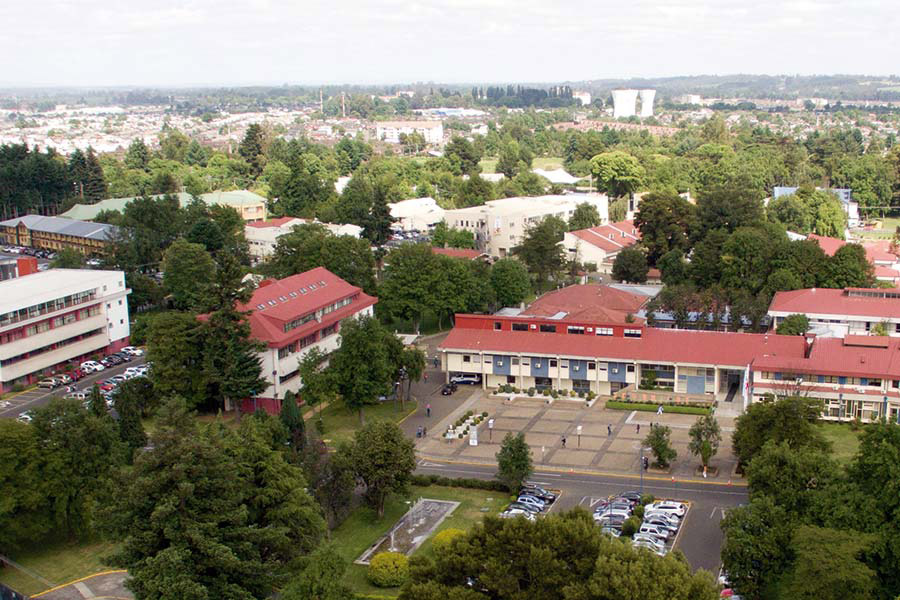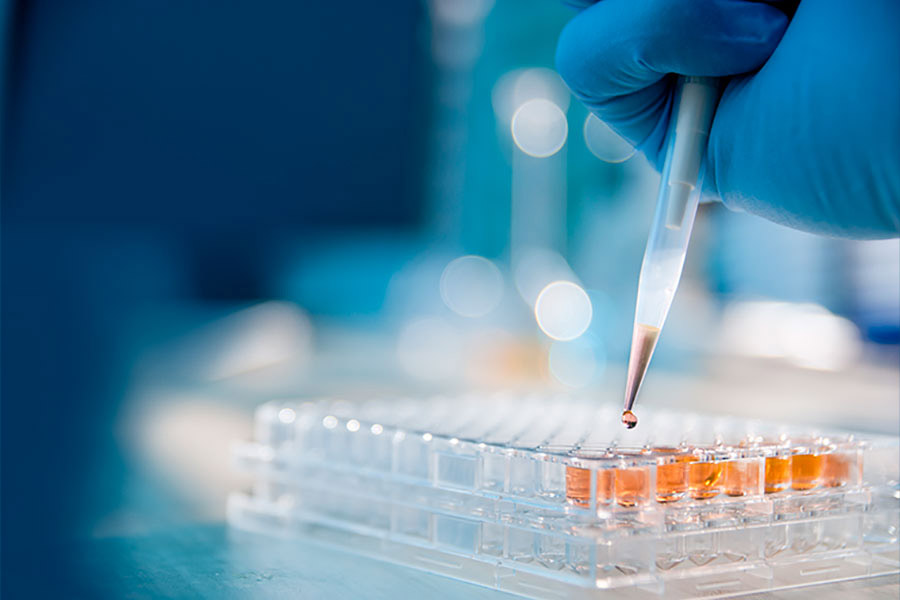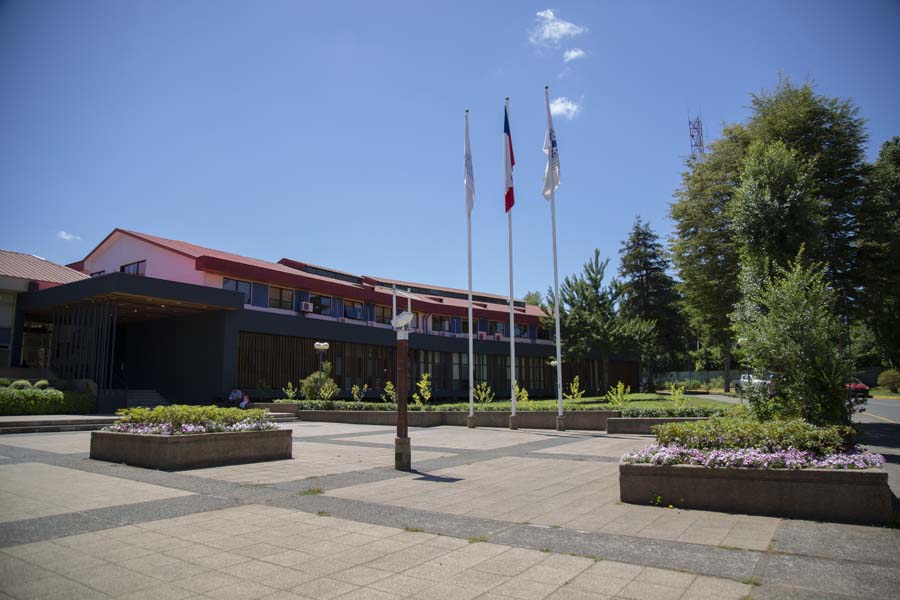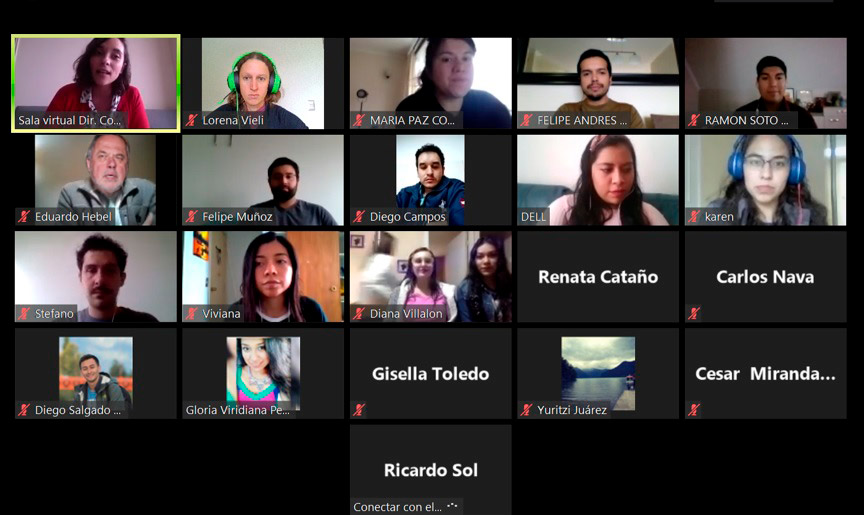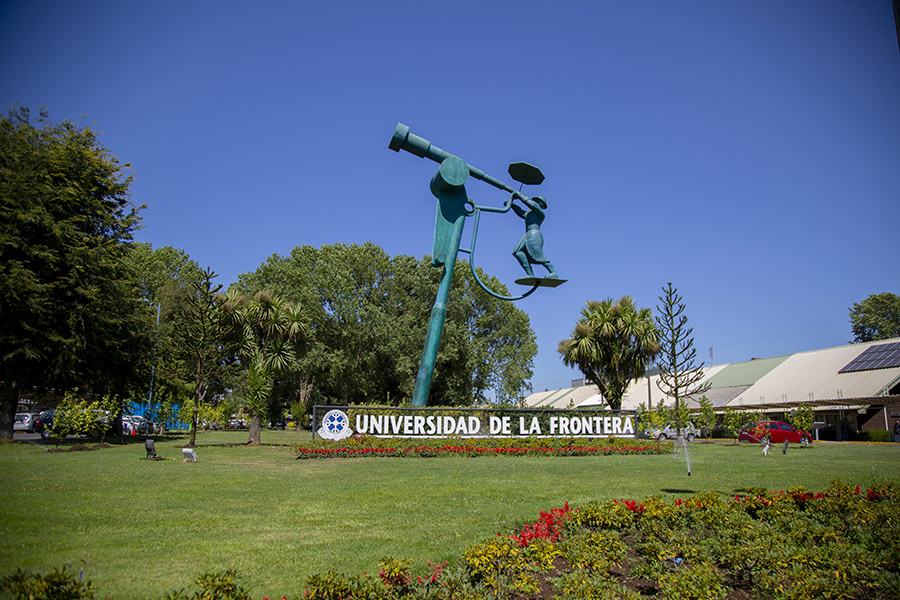|
The collaboration is based on a R & D Agreement to explore the scientific potential of marine micro-organisms in the southern macro-zone of Chile and is extended for three years, expecting auspicious results. |
The main focus of this ambitious R & D Agreement between the Universidad de La Frontera (UFRO) and the Canadian company Mara Renewables (Mara) is the biodiversity and scientific potential of marine micro-organisms in the southern macro-zone of Chile. Within the framework of this strategic alliance, the company's Director for Research and Development, Dr. Roberto Armenta, visited UFRO, where he had important meetings with the Vice-Rector of Research and Graduate Studies, Dr. Renato Hunter, and the Director of Research and Technology Transfer, Franklin Valdebenito, among other university authorities. “We are working together on the discovery of marine microorganisms. They are important because they produce certain compounds, in this case lipids, fats that are relevant to human nutrition and have beneficial properties for our health. This partnership is important because we will be able to have access to certain microorganisms from this part of the world,” Dr. Roberto Armenta explained. The person in charge at UFRO in this collaboration agreement that will last for three years is Dr. Carolina Shene. “During this phase we are investigating and isolating different strains that could be of interest for Mara, while they will carry out an analysis in Canada, in order to determine if these strains are useful for the research they want to carry out or not,” Dr. Shene explained. Mara develops research for the food industry, focusing on the production of algae derived DHA-rich omega-3 oil for nutrition applications and naturally-sourced products. “This agreement is very important, because there are not many companies that work with this type of microorganisms. It is an area of highly specialized knowledge and this part of the world has a biodiversity with great potential. The main strains of these microorganisms will be identified and this information will be passed on to Mara, in order to determine if they can be produced on a larger scale, since we have the capacity to grow them on a larger scale, and to asses if their production is cost-effective,” Dr. Armenta pointed out. The R & D Agreement foresees that in the next few months they will be working on issues directly related to technology transfer, since the idea is to visualize a patent for an invention that should be jointly protected.
Written by: UFRO Communications Office
|
|
|
Dear University Community, With respect to the decision of the health authorities to lift the mandatory quarantine in the city of Temuco on Thursday, April 30, at 10pm, we would like to inform the University Community that, as already mentioned before, our institution will maintain the preventive suspension of academic and administrative activities. Only the ones who have to fulfill tasks that are critical for the appropriate functioning of the university will be authorized to access the Campus. This measure is equally effective for our Campuses in Angol and Pucón and will be extended until Thursday, May 7, when we will evaluate the situation again and inform you in due course. Kind regards, Temuco, Chile, April 28, 2020
|
|
The International Affairs Office of UFRO and its unit for National and International Student Mobility welcomed the international students, who decided to still carry out their studies at UFRO during the first semester of 2020, online. The students from Brazil, Spain and Mexico opted for remote learning with online classes, which they will be attending. |
Coronavirus is causing major changes in our way of life, but there are people who are still doing their best to achieve their goals, as in the case of some foreign students who have decided to continue their student mobility at the Universidad de La Frontera (UFRO) as planned, even though the conditions have changed due to quarantine and social distancing. A total of 12 international students will be staying in Temuco to pursue their studies at UFRO, which announced the implementation of virtual education for the first academic semester of 2020 as a response to COVID-19. Most of them are young students from Mexico and their reasons for continuing at UFRO are mainly based on the possibility of obtaining an equally significant learning experience thanks to the implementation of online classes, a strategy that has been adopted for all undergraduate programs. Rector Dr. Eduardo Hebel insists that the first priority for UFRO is the health and well-being of the entire university community, and of course, also of the students who come from abroad. “It is absolutely necessary to fulfill the safety measures established by the health authorities and to take certain precautions,” he explained. The Director of the International Affairs Office of UFRO, Dr. Lorena Vieli, explained that also another group of students will study at UFRO, attending classes from their home countries, in this case three students from Brazil, one from Spain and two from Mexico. “Our intention is to contribute with whatever is necessary to make their experiences more valuable. Many students came with the expectation of getting to know a new culture and a different university, and we are doing our best to help these students to achieve their goals, even if it is in a non-presential way.” VIRTUAL WELCOME The reception of the international students at UFRO has been mainly focused on sharing significant aspects of the Chilean culture and social life. Therefore, several activities were organized for the students, including a conversation about the social outburst in Chile, carried out by the psychologist Diego Espinoza, and a conversation about gender equity, carried out by the team of professionals of the UFRO Office for Gender Equity. The initial meeting was attended by the different units of the Vice-rectorate for Undergraduate Affairs, with the participation of Felipe Opazo of the Language Coordination Center and Felipe Muñoz, who is in charge of the General Electives. The Coordinator of the unit for National and International Student Mobility, María Consuelo Sánchez, thanked everyone for their participation and explained that they are currently working on the process of registration and enrollment for the international students and on providing internet connectivity grants to 9 students who applied for the aid.
Written by: UFRO Communications Office
|
|
The Universidad de La Frontera has significantly improved in this ranking, by climbing six places up since 2018. |
The Universidad de La Frontera (UFRO) is ranked in sixth place in the Overall Ranking of Chilean institutions for higher education in the latest Scimago Institutions Rankings. It has significantly improved over the last two years in this ranking, climbing from place twelve in 2018 and seven in 2019 to the sixth place this year. This university has constantly improved its indicators of scientific productivity and is ranked first among the Chilean regional state institutions. “As a complex university we are proud of the position we achieved. It validates the processes of continuous improvement that UFRO has implemented within its institutional development plan and in particular in its strategies for research and innovation,” Dr. Renato Hunter, the Vice-rector for Research and Graduate Studies, said. The Scimago Institutions Rankings (SIR) is a science evaluation resource to assess academic and research-focused institutions by a composite indicator that combines three different sets of indicators based on research performance (50 %), innovation outputs (30 %) and societal impact (20 %), measured by their online visibility. In the Research Ranking the Universidad de La Frontera is in place 11 out of 35 ranked universities and in the Innovation Ranking it is in 8th place, being the second best regional university in this category. With respect to the Societal Ranking the UFRO managed to climb from 9th place in 2018 and 8th place in 2019 to the 6th place this year. According to Dr. Renato Hunter the challenge is to keep improving, by establishing more and better mechanisms for internationalization and networking, which will allow this university to keep developing cutting-edge science and technology. Click here to view the Scimago Rankings Escrito por: Karimme Riadi
Vice-rectorate for Research and Graduate Studies |
|
The more than 9,000 undergraduate students at UFRO experienced a different start of the semester last Monday, April 13. This virtual teaching modality will have a trial period of two weeks, so both students and teachers can get used to this new way of learning and teaching. |
For the rector of the Universidad de La Frontera (UFRO), Dr. Eduardo Hebel, the process of getting used to these virtual classes is a big challenge. It is not only the best way to cope with COVID-19, but also a great opportunity for the university to innovate and modernize the teaching and learning processes according to the educational requirements of today’s world. “Obviously we would like to have every aspect under control, but the contingency forced us to take on this challenge and to adapt our capacities during these times of uncertainty,” he said. The Vice-rector for Undergraduate Affairs, Pamela Ibarra, explained that the university has taken on the challenge of changing from a classroom-based learning environment to a virtual one during this public health emergency caused by COVID-19. For this purpose, she explained that they have worked on a plan that considers several aspects for the implementation of this measure, such as the technological training of teachers and students and the strengthening of technological support. However, she stressed that the most important thing is that both teachers and students approach the process in a flexible and open way. FRESHMEN WELCOME CEREMONY ONLINE The activities for new students of the generation 2020 also took place online, with a high participation rate. For a whole week, they were the protagonists during the traditional welcome ceremonies, but this time online, due to the health emergency. Via the Virtual Campus platform of UFRO they were received with a warm welcome by the rector of the university and by their program directors. The students had access to different contents that were especially prepared for them, got to know the university and got more information about their respective study programs. They also had access to information on the campuses, services, socioeconomic benefits, the student health service, study strategies and techniques (focused on e-learning), and so on. On this interactive platform, the students have the chance to review contents and to interact with their program directors and teachers. STUDENT SUPPORT To assist those students who do not have access to the Internet and to facilitate their incorporation into the virtual classrooms, the Universidad de La Frontera opened a call for the students who need a “Connectivity Grant”, which consists of a financial contribution that lasts three months, to improve their data plan and/or purchase one. The grant allocation and selection criteria are the responsibility of the UFRO Office for Student Development. They also evaluate the background of those who applied for funding for computer equipment. QUALITY AND TRAINING PROCESSES As part of the process, UFRO will also establish a collaborative work group of authorities and student representatives, as well as a technical group of institutional experts in online assessment and methodologies, which will monitor and identify the areas that require improvement. These groups will also have the support of the UFRO Quality Division, so together they will be able to carry out the required modifications and adjustments in order to maintain the training programs´ quality to which the university is committed.
Written by: UFRO Communications Office
|





